As more EV chargers grace the roadways and parking lots of the world, thieves are taking advantage. The cables that connect chargers to cars use valuable copper wire, making them easy targets for those who want to make a quick buck by selling the metal to scrapyards or recycling facilities.
Because thieves want to make as much money as possible, they’ll often hit every charger at a given station, according to PBS, leaving the entire location totally useless until each cable is replaced. The resulting downtime means inconvenienced EV drivers, added costs, and yet another obstacle for mass electric vehicle adoption.
Seeing an opportunity in the market, one company has figured out a deterrent for keeping thieves away from EV charging cables using a decidedly low-tech solution: Pressurized liquid dye.
It All Started With Catalytic Converters
The company, CatStrap, is known for making anti-theft devices for catalytic converters. Their namesake product is a strap you wrap around your exhaust, made from three layers of strip steel (a flat, bendable type of steel) that makes it incredibly difficult to cut through with an average cutting device. Since 2013, founder Tom Birsen and his son David have been making the CatStrap as a side project to the family’s main auto repair business. Then, seven years ago, demand shifted.

“In 2018 and 2019, the catalytic converter theft activity kind of transformed into an epidemic, more or less, where it really started to spread,” says David Birsen, who is now the company’s vice president. “The price of the precious metals in [the catalytic converters] started to rise, leading into 2020, when things just went hockey stick from a theft activity standpoint. And so our business went from something that was kind of a side project to a full-time manufacturing facility.”
The Birsens shut down their auto repair business and have been focused on theft protection devices ever since. The idea to break into the EV charger cable protection game came from one of CatStrap’s existing customers.
“About 18 months ago, one of our commercial customers, a municipal government out in the Seattle, Tacoma area, started to electrify their fleet,” the junior Birsen told me. “So they had EV chargers at their facility, and folks were cutting down the fence and chopping off their EV charging cables. So they actually put it on our radar for the first time that EV charging cable theft is now a problem for the copper scrap value.”
The First Iteration Of Cable Charging Protection Is Born
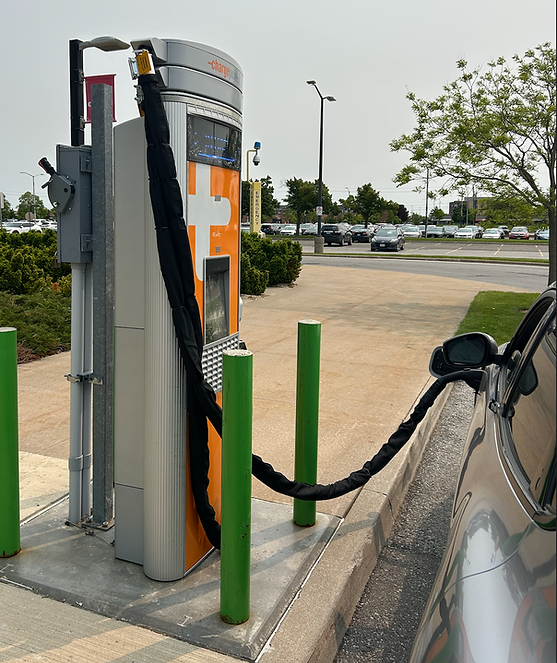
Birsen’s solution? A product called the EV Cable Shield. Like the CatStrap, this device consists of a series of strip steel pieces—four in this case. The steel runs the length of the charging cable, surrounding it on each side for full protection. Getting the steel hard enough to actually stop thieves wasn’t easy.
“The strip steel material that we’re using is very similar to what they actually manufacture the saw blades out of, except ours goes through an extra heat treatment process that raises the hardness of that material, just a level above what you’ll find in the hardest saw blade tool that you can buy at Home Depot, for example.”
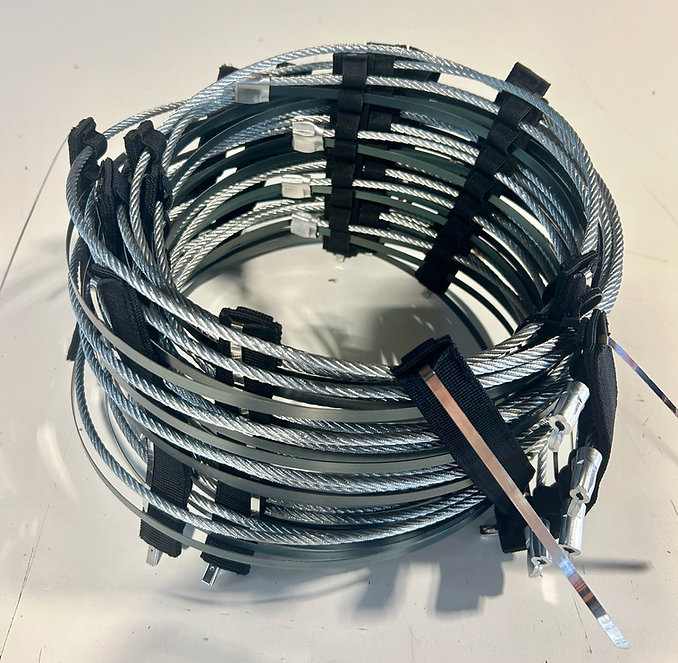
“So most Sawzall blades top out at around 47 to 49 on the Rockwell hardness scale. And our strip steel spec, it’s from 53 to 55 on that Rockwell hardness scale,” says Birsen. “So basically, what happens when you have even a high-quality Sawzall blade, and you try to cut through these three layers of hardened strip steel, the teeth on that blade will just wear out before you can actually cut through the material. And so after a couple of minutes of cutting, you’re basically just left with a dull blade.”
“It’s just a really frustrating, difficult job to get through,” he says. “You need at least a fresh pack of spare blades in order to actually complete a cut. And so, we just don’t see that happening out in the real world.”
For the Cable Shield, CatStrap went even further, adding another type of metal to make it even tougher for thieves.
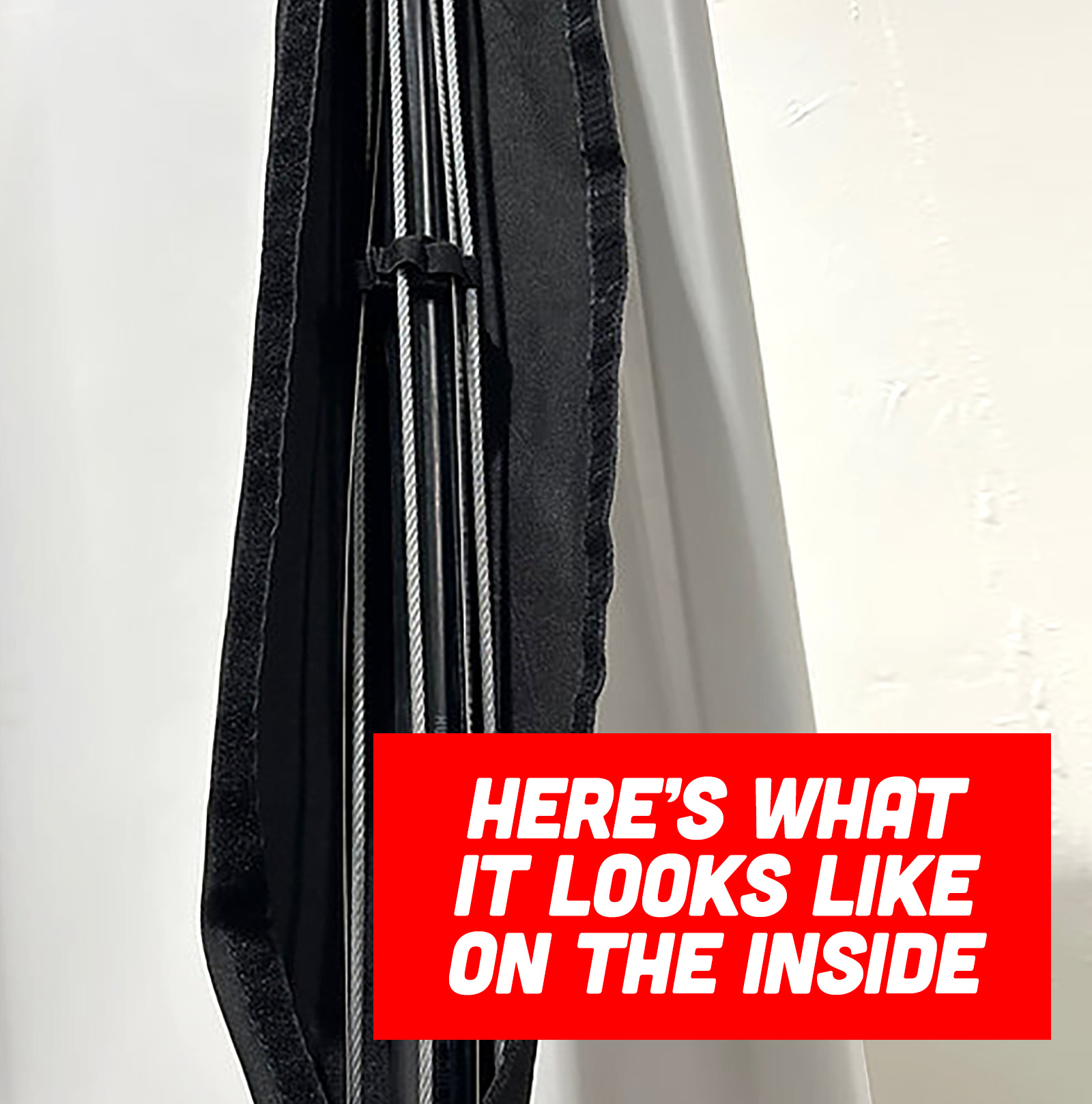
“We also intermix [the strip steel] with steel aircraft cable, and the reason that we’re using two materials in the EV charging cable space is because there’s no one tool that’s effective at cutting both types of material,” Birsen says. “So you’ll have a bolt cutter type of tool that can’t get through a very ductile, flexible aircraft cable. Or more of a saw type of tool, where those steel strips are just gonna destroy the teeth. It’s the combination of those materials for the EV cable that makes it really difficult to cut.”
Two major considerations in adapting the CatStrap product to EV charging cables are that charging cables aren’t hidden away under the car, and they have to move freely without assistance. Adding the same level of protection while keeping those two things in mind was a challenge, according to Birsen.
“There are new constraints for charging cables—mainly that they’re flexible,” he says. “You need to remain lightweight, and you can’t inhibit the usability of the cable at all from a consumer experience. There are also some more aesthetic requirements for an EV charger compared to the underside of the exhaust of a car, where no one really sees.”
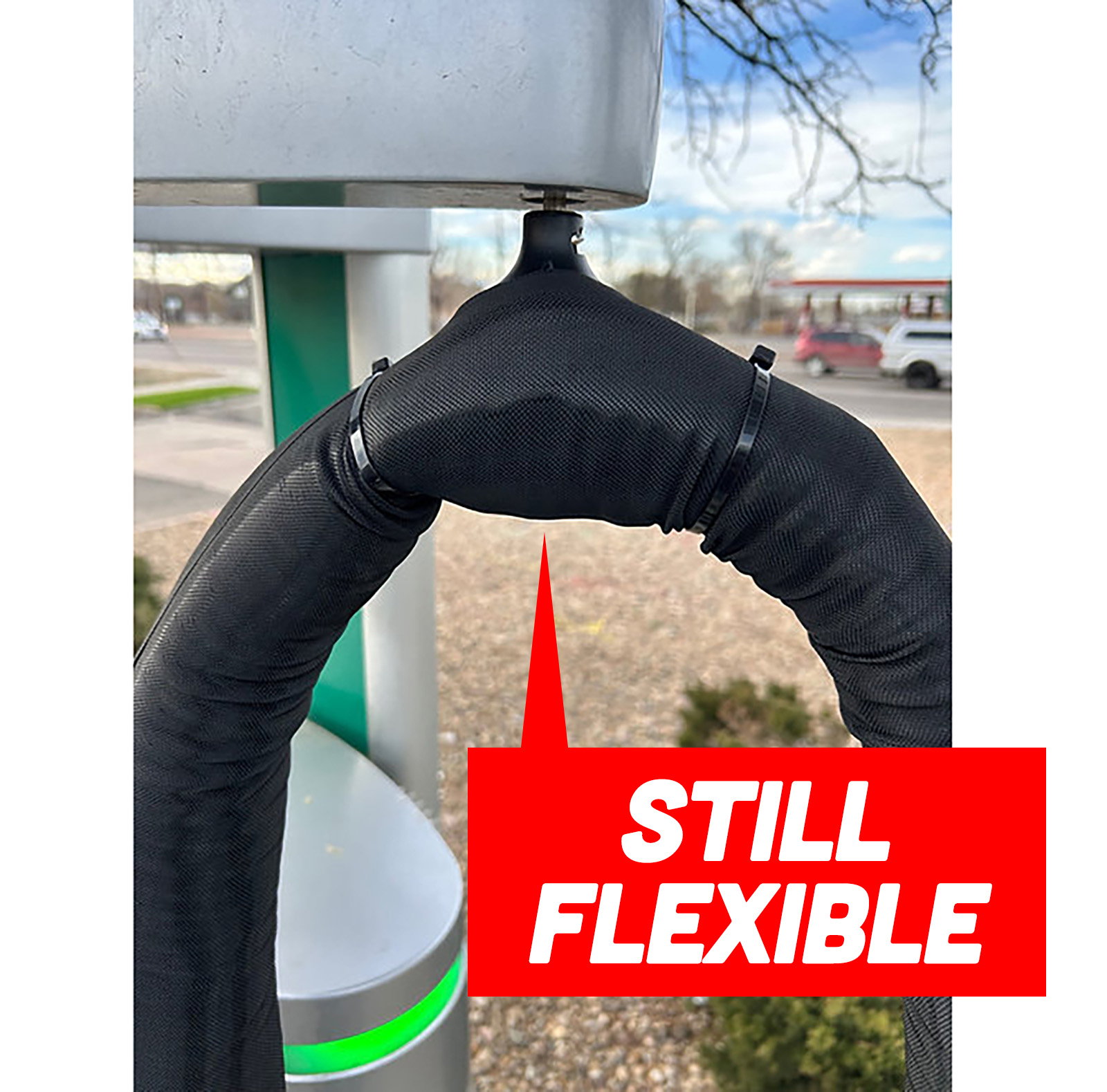
To that end, the entire setup is wrapped in a black nylon sheath that seals via a Velcro-type fastener. The result is a chubbier, slightly heavier wire that can still be maneuvered by an average person without them having to struggle.
An Extravagant Deterrent
Birsen says his company has sold around 2,000 of its EV Cable Shields so far, with the product now making up about half of CatStrap’s business. Of those 2,000 Shields, around 1,000 have come equipped with a $100 add-on product called the DyeDefender. It’s a pressurized line of liquid that sits alongside the steel in the Cable Shield. When cut, it releases a blue dye that shoots out in the direction of whoever is attempting to cut the cable.
“[It was] originally developed for the catalytic converter product, and really inspired by what the banking industry does, with those blue packs that release that powder if someone runs off with [money]. And in like glitter bomb type of inspiration from YouTube videos,” Birsen tells me.
He says he took additional inspiration from the automotive industry, using nylon braided fuel lines to hold the dye. The liquid itself is 60% vegetable glycerin and 40% water, with less than 1% food-grade blue colorant. Birsen says the solution mimics antifreeze properties, so it stays liquid in cold weather. The line is pressurized to 80 PSI, which is enough to shoot “several feet” of spray, but not so much that it’ll injure someone.

In addition to causing a huge mess, cutting through the line would mark the culprit with a bunch of obvious blue dye, making them an easy spot for law enforcement.
“If they did try to cut through one cable, it’s highly unlikely that they’re gonna go down the line at a typical EV charging station where there’s six or eight cables and continue doing that because it creates a real mess and [it’s] not something that these guys are used to dealing with,” says Birsen. “It certainly prevents any sort of catastrophic damage where they wipe out an entire station.”
How Effective Is It? Well, No One Really Knows Yet
Despite having sold over 1,000 EV Cable Shields equipped with the DyeDefender system, no one has been brave enough to attempt to cut past the setup just yet, according to Birsen.
“We are still waiting for our first documented video of a thief cutting through this and seeing the blue spray on them,” he tells me. “To date, all the videos that exist are from our own internal testing. Everything that has been deployed, there has not been an attempted cut yet, actually.”
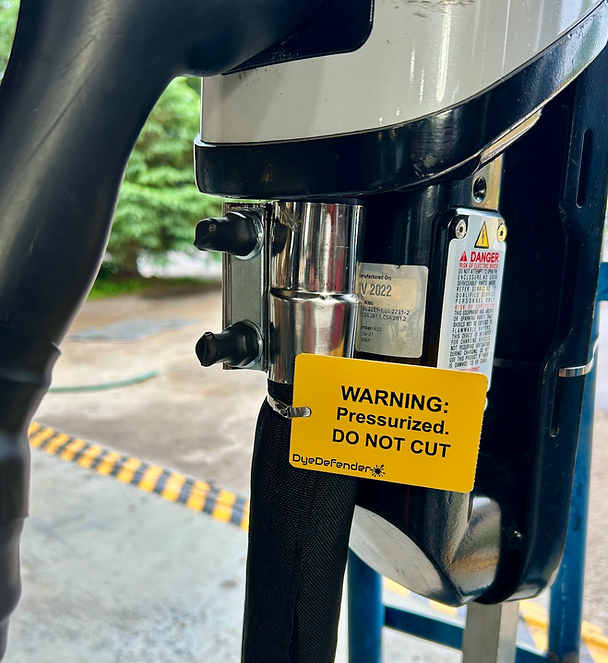
Birsen says the lack of attempts likely comes down to the yellow placard that comes with every DyeDefender system. It sits right at the beginning of every cable equipped with the option, warning potential thieves that what they’re about to cut into is, in fact, pressurized.
“I think ultimately our goal is: Can we provide enough of a visual and psychological deterrent where a thief doesn’t even try in the first place? And so we do provide that yellow warning tag with every unit that says, ‘Warning, pressurized, do not cut,’ which is important both from a deterrence standpoint and from a liability standpoint to make sure that we’re covering both ourselves and the customer,” he says. “That has been incredibly effective at getting a thief to just walk up to the unit and walk away without even trying.”
To all the EV charging cable thieves out there: Be careful. Next time you try to steal some copper from a charging station, you might end up looking like the newest member of the Blue Man Group.
Top graphic image: CatStrap









There’s so much copper theft going on around here it’s actually quite depressing.
It’d have been nice to know what the retail pricing was for the catalytic converter protection if it’s still a product they make.
Catstrap starts at $160. https://www.catstrap.net/
Thanks, and I will be checking bees for drinks at the earliest opportunity! 😉
After that top pic I was expecting a Ron Jeremy joke,
Did anyone else immediately think of Smurfs as a solution to blue dye?
I guess you could say he was “buy curious”
Can’t you design a charger cable to retract into the machine or stow inside a locker or something?
You could, but I think you’d need a pretty big space to stow them since they are large diameter and don’t bend with a super tight radius. And of course buying one of these is cheaper than upgrading to a whole new charging station.
That’s fair. I mean more for “next gen” chargers—seems like vandalism resistance ought to be part of the design brief. I hadn’t considered the physical challenges of DC cables. Still, surely there’s got to be a way
…don’t call me Shirley. In Europe, it seems they have ports, and the drivers bring their own cables. This allows for some chargers to be built into curbstones.
I was thinking the same thing. Either retractable or have a big metal box that it can simply be coiled up inside. If the cable isn’t put back, the charge session doesn’t close, credit card is charged extra or something.
You can’t automate away every problem. If users just put the cable back inside of a locker, it becomes far more difficult to get the cable.
Yup. We’ve figured out how to secure tens of thousands of dollars (ATMs) in all kinds of sketchy places. I know a giant cable is different than stacks of cash, but there’s still got to be a way. And yes we still see videos of ppl breaking into ATMs in all kinds of creative ways, and theft will still be a problem for chargers BUT the point is to make it so much of a pain that most ppl will decide it’s not worth it.
This problem could have been solved 20 years ago. Scrap yards paying the thieves. Skum bag must have picture ID. Take a picture of it and him and what hes selling. Check will be mailed to you. BOOM 95% reduction just like that.
and i aint that smart
It would be a great ROI for society if police departments did some undercover busts of scrap dealers to shut down the shady ones.
That’s some mighty fine police work there Lou.
Someone recently came and stole a bunch of copper gas pipes from the side of my apartment. They did at least turn the gas off first. (Didn’t get mine fourtunately)
Is copper gas pipe legal?
It is in the UK, probably because it doesn’t spark. That said, they’ve replaced it with steel pipe, but that was to make it less likely to be stolen.
Well IMHO there is this
1. Electric fence keeps thieves out
2. If no one has attempted to steal it is employees stealing.
3. Can you keep the cable recessed until a code or card is scanned and thus revealing the offender.
Can we just save some trouble and clean up the gene pool by delivering 800VDC directly into the bolt cutters when the tweaker tries to cut it?
There’s a reason they mostly come with insulated handles
Replace blue dye with white phosphorus enriched napalm.
Problem solved.
Black PPE and a gas concrete saw would take this down. A thief that could afford a gas probably wouldn’t be stealing charger cables.
Thieves don’t actually ever pay for anything.
In the rural area I live, there isn’t much crime. The chargers on the nearest town to have them are always broken down due to some other reason.
Do you think so? I’ve cut lots of things the right way and the wrong way and found that if a thing is made for cutting a certain thing, it’s often pretty terrible cutting other things. That’s a very vague way to say: even using a blade for thin iron/steel to cut aluminum can gum it up, leaving metal between the teeth and ruining the blade. Likewise wood blades for any metal (“wood with nails” is often the same or similar tooth profile, but carbide instead of the bimetal you can get away with on plain wood), a metal blade for wood, wood for plastic, you get the idea.
Unless you can fit metal cutoff wheels to gas saws (I genuinely don’t know), in which case yeah the cable is gonna have a bad time. I’d also be interested to see what you can do with a heavy duty angle grinder – a sawzall is a tool that leans right into those saw-type (i.e. with teeth) weaknesses I described above.
If you use a chop saw blade it wil slice through the cable like a stick of butter. I have a metal cutting blade on my chop saw in the garage. The blade will fit a gas chop saw nicely.
Nice. I really gotta try one of those, do enough metal cutting to justify it for sure
I have a Vevor, they are great for precise or bulk jobs. I’m sure harbor freight has a selection as well. An angle grinder is great for a lot of jobs, but they still make me nervous whenever I use one.
There is a wonderful scene in Deadend Drive-in passing a guy using a chop saw to take out traffic signals.
No one pays attention to it.
Sparks everywhere.
Just like crime these days.
Yeah, big beautiful crime, the likes of which nobody’s ever seen before, top to bottom, left to right.
Never seen the film, but I don’t watch much these days. Sounds kind of like the parking meter scene in Cool Hand Luke.
Reminds me of a video that’s got to be at least a decade old where a guy repeatedly “stole” his own bike in various ways to see if anyone would do anything. IIRC, no one cared. As long as you’re wearing a reflective vest, angle-grind anything to your heart’s content and no one will think twice.
I don’t remember that scene, but there is an ending to a Davinci’s Inquest, where Davinci walks up to a meter with a big manual pipe cutter, and slices the meter down like a tree.
Deadend Drive-In is one of the best dystopian science fiction films coming out of Australia!
The guy with the chop saw plays multiple roles in the flick.
Now im curious: anyone know how much people actually get when they sell these? Is this a situation where someone causes thousands of dollars of damage for like $50?
Not a clue. My EV experience to date involves driving by a few charging stations and rides in Tesla models S, Y and 3.
Pretty much
Not that I would know first hand, but isn’t an angle grinder the tool of choice for criminals these days? Unless you’re stealing 2x4s – then sawzall is for sure the way to go…
They will use a saw if it’s all they have, but yes, a grinder is the usual.
I think Eiffel 65 is the VC funding this company.
Shut up and take my updoot.
they had to invest somewhere after the gaming console royalties dried up.